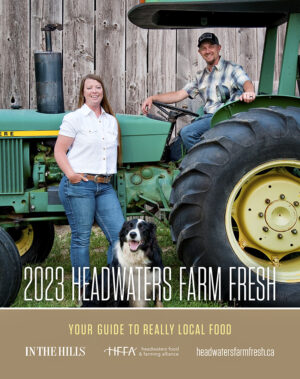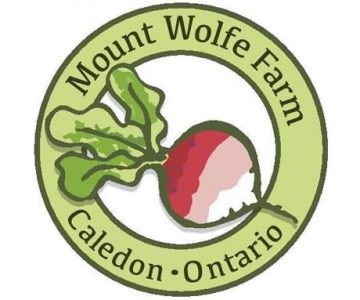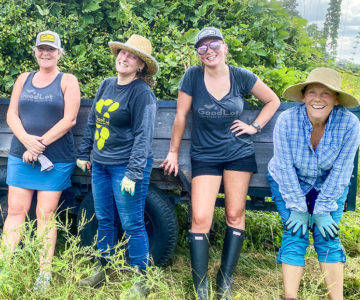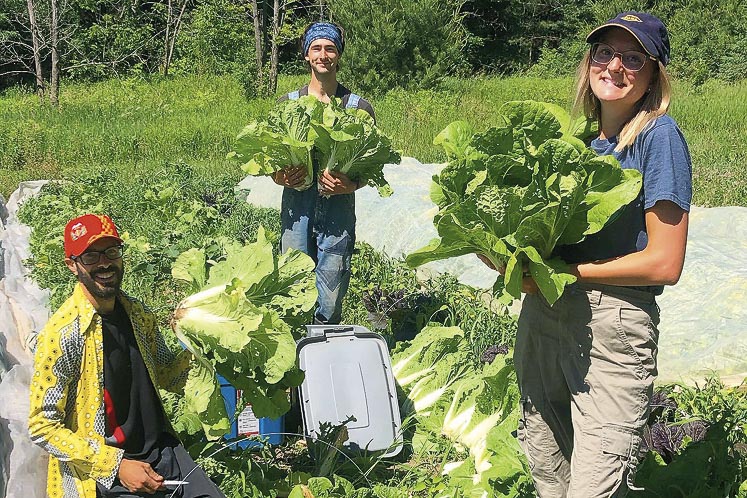Regenerating Our Relationship with the Land
Pick up this year’s Headwaters Farm Fresh guide to get to know your local farmers and explore the beautiful countryside in our own backyard.
A new season begins. Robins nesting in the old birdfeeder. Hens gobbling up insects and tender grass shoots. CSA members coming back to farms, including our own Mount Wolfe Farm, for their first basket of the season. And publication of the new issue of the Headwaters Farm Fresh Guide!
There’s a perceptible shift in how agriculture is valued in our countryside. Will our rural towns and townships ever go back to the early 20th century when family farms were the dominant economic and cultural drivers? Or to a pre-European world where the land provided for all the First Peoples’ needs?
Likely not. Yet there’s an abundance of opportunity to move toward a paradigm, which Joe Brewer, author of The Design Pathway for Regenerating Earth, describes as “treating the entire landscape as a functional whole and cultivat[ing] the capacities for collaboration that match systemic health requirements.”
What does this look like? It looks like addressing whole system issues such as biodiversity loss, nitrogen and phosphorus cycling, climate change, freshwater use and land-use change. And it means moving toward co-operative local governance, regenerative economies and a plan (design pathway) to lead us away from the precipice of planetary collapse.
For many of us listed in the Farm Fresh Guide, it is this challenge that energizes us and gives us momentum to go on for generations. Some of us are new to the field; in our case, the 100 acres our parents bought in 1966 have become a thriving Community Supported Agriculture (CSA) operation entering its eighth season. CSAs are inherently small-scale and local, with members who share some of the risk by paying up front for their food, understanding the season’s chips will fall where they may.
The scale at which we farm allows us to be thinking, designing and experimenting with regenerative agriculture, generational legacies, and social and ecological stewardship. Scale of farming is an under-represented consideration in our governing land-use system comprising municipal zoning, official plans and provincial policies, and it is these built-in barriers we must break down in our design pathway to regenerating the precious land and watersheds that sustain us.
Lots to chew on. In the meantime, here’s to a glorious season of fresh, local food!
Debbe Crandall is co-owner of Mount Wolfe Farm in Caledon, an 11-month CSA that grows summer and winter vegetables and sources locally produced foodstuffs for their members and markets.
WELCOME TO LOCAL FRESH FOOD
 Headwaters Farm Fresh is a joint project of Headwaters Food and Farming Alliance and In The Hills.
Headwaters Farm Fresh is a joint project of Headwaters Food and Farming Alliance and In The Hills.
We hope this year’s Headwaters Farm Fresh guide will inspire you to get to know your local farmers, put fabulously fresh food on your table and, as a bonus, explore the beautiful countryside in our own backyard.
The easy-to-use maps and listings in both our online and print guide are designed to help you find the very best vegetables, fruit, meats and craft beverages that farms in Caledon, Dufferin and Erin have to offer — whether it’s direct from their farms, through a CSA, or at a weekly farmers’ market or independent retailer.
Support local farmers.
Enjoy local food.
Related Stories

Mount Wolfe Farm
Apr 25, 2018 | | Headwaters Farm FreshSummer and winter vegetables, maple syrup, honey, garlic, eggs, bread, seasonal fruit, preserves, microgreens, home-care products

Seize the Local Moment
Jun 24, 2022 | | FarmingWe’re lucky to live in a farm region that cares so much about food and that is embracing new opportunities in food education and ecoliteracy.







